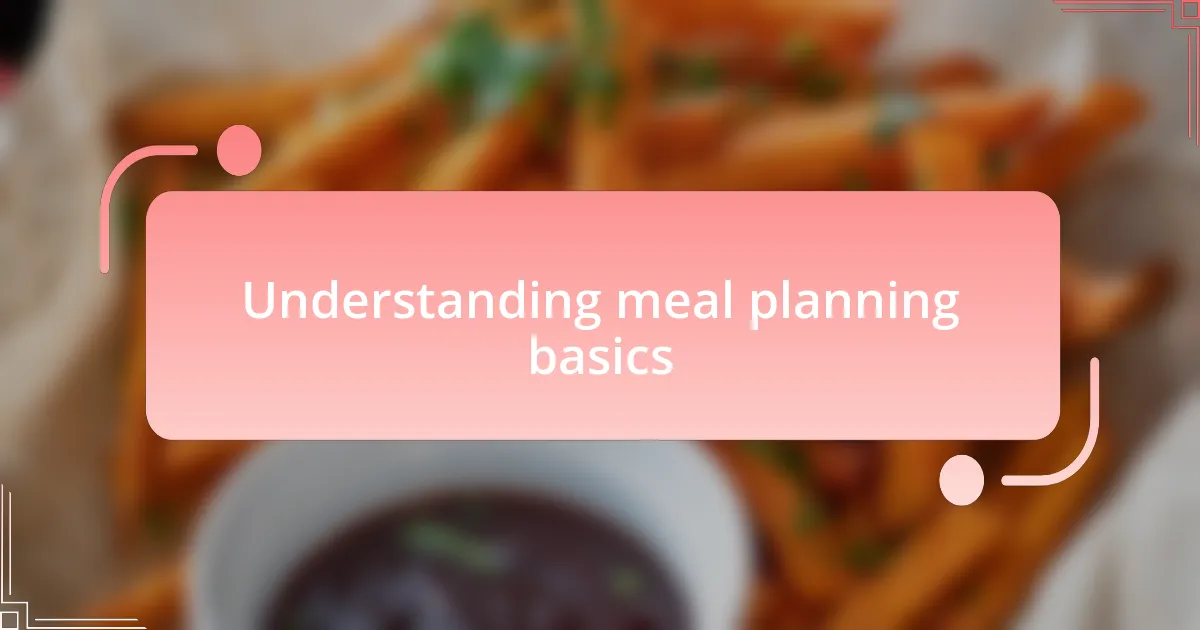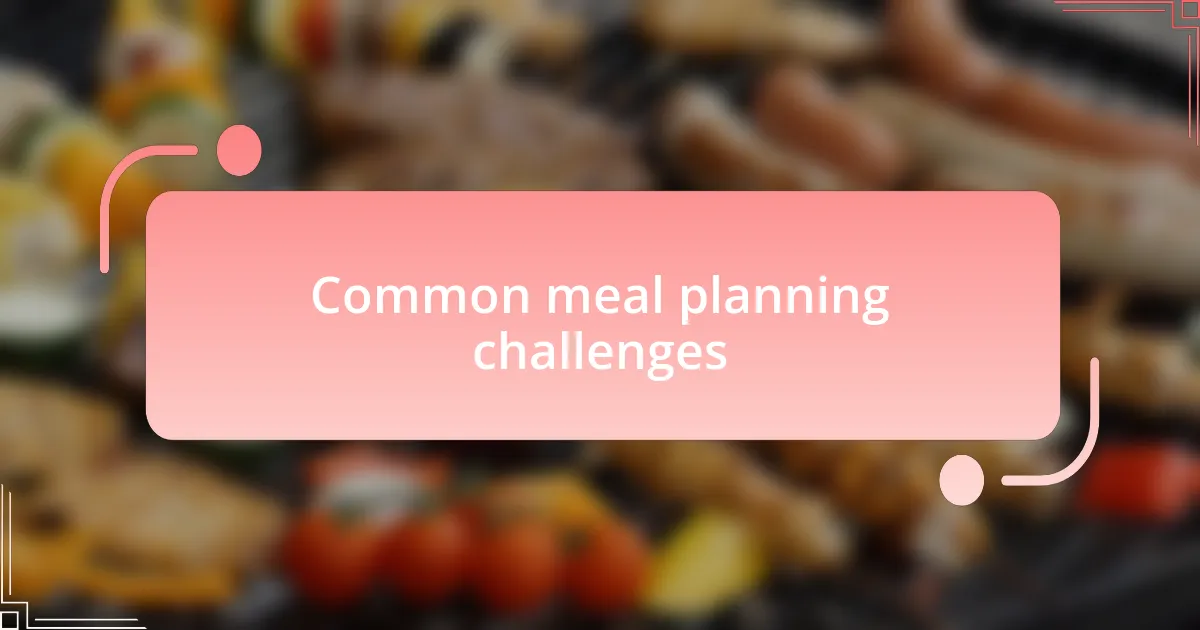Key takeaways:
- Meal planning enhances time management, nutrition, and encourages variety in meals.
- It reduces food waste and alleviates stress during busy weeks by providing pre-prepped meals.
- Common challenges include deciding what to eat and adapting to unexpected schedule changes.
- Effective strategies include batch cooking, maintaining flexibility, and implementing diverse ingredients.

Understanding meal planning basics
Meal planning is more than just a grocery list; it’s an approach to managing your time and nutrition effectively. I remember when I first started meal planning, the idea felt overwhelming. Could I really stick to a plan? But as I got into the groove, I realized that it actually simplified my days.
Understanding the basics means focusing on balance and variety. I learned to create meals that not only nourished my body but also excited my palate. Have you ever felt stuck in a rut, eating the same meals over and over again? Planning ahead helps break that cycle, allowing me to experiment with new ingredients and flavors without the last-minute stress.
It’s crucial to consider your schedule when meal planning. For instance, I’ve found that preparing meals on Sundays sets me up for a successful week. I often ask myself: What days will I have time to cook? Answering this helps tailor my planning and ensures I won’t fall into the trap of unhealthy last-minute choices.

Benefits of meal planning
One of the most notable benefits I’ve experienced with meal planning is the improvement in my overall health. By dedicating time to plan my meals, I’m able to prioritize whole foods over processed options. Have you ever noticed how much better you feel after eating a homemade meal? I certainly have; it gives me a sense of accomplishment, knowing I’m nourishing my body intentionally.
Another perk I’ve found in meal planning is the reduction of food waste. It’s shocking to see how much can be thrown away when meals aren’t prepped. By scheduling what I’m going to eat, I can make the most of my groceries and minimize trips to the store. I remember one week I planned to use up all my veggies before they wilted, and not only did I save money, but I also discovered some delicious new recipes along the way.
Finally, meal planning has significantly eased my stress around busy weeknights. Instead of staring blankly into the fridge, I simply pull out a pre-prepped meal from the fridge or freezer. This efficiency means I spend fewer evenings feeling rushed and more time enjoying my meals. How about you? Have you ever felt that last-minute frenzy? For me, having a plan transforms chaotic evenings into calm moments of preparation, allowing me to savor my time in the kitchen.

Common meal planning challenges
Meal planning may sound straightforward, but one of the most common challenges I face is the overwhelming task of deciding what to eat for the week. Have you ever flipped through recipe books or scrolled endlessly through websites, only to feel more lost? I remember once spending two hours trying to settle on a menu, and by the end, I was exhausted and less motivated than when I started.
Another hurdle is dealing with unexpected schedule changes. Life is unpredictable, and I often find that my carefully crafted meal plan gets derailed. There was a time I planned to cook a slow-cooked stew, only to have an impromptu dinner invitation pop up. I had to either scramble to find alternatives or let food go to waste. It’s a tough balance between sticking to my meal plan and being flexible enough to adapt.
Lastly, I often struggle with portion control and balancing meals. It took me some time to realize that just because I planned a dish doesn’t mean I have to eat it all at once. I vividly recall a week where I made a huge batch of quinoa salad, thinking I’d enjoy it for lunches. By day three, I was so tired of it that I couldn’t bear to look at any leftovers. It made me rethink how to incorporate variety without wasting the meals I had planned. Have you faced similar issues? Remembering to keep meals diverse while sticking to my plan has become a vital lesson in my meal planning journey.

Strategies to overcome challenges
One effective strategy I discovered is to embrace batch cooking. Instead of preparing different meals every night, I cook larger portions on weekends. There was a time when I made a big pot of vegetable soup and froze individual servings. Not only did it save me time during the busy week, but I also had the comfort of a warm, healthy meal ready at my fingertips. Have you tried batch cooking? It really simplifies the process!
Flexibility is another critical aspect to tackle meal planning challenges. I learned to keep my meal plans adaptable, allowing me to shuffle dishes around based on what life throws my way. For instance, when my schedule got hectic last week, I swapped a planned stir-fry for a quick salad I could throw together in minutes. This adaptability has turned potential frustrations into opportunities to explore new, simpler meals.
Lastly, I recommend using a diverse ingredient approach in your meal planning. I often choose a few staple ingredients and play with different seasonings or cooking methods throughout the week. I remember a time when I made chicken thighs, and with just a few tweaks, they became lemon herb roasted one night and spicy BBQ the next. It kept me excited about what I was eating and prevented that dreaded meal fatigue. Have you found joy in mixing things up? It can make all the difference!

Personal lessons from my experiences
Through my journey with meal planning, one vital lesson I learned is the importance of missteps. I vividly remember a week when I meticulously planned every meal, only to find myself exhausted and unmotivated by Wednesday. It taught me that perfection isn’t the goal; rather, it’s about progress and allowing myself the grace to adjust my plans. Have you ever felt that way, where the pressure of following your own plan becomes overwhelming?
Another insight I gained is the value of making meals enjoyable. I once hosted a small dinner for friends, where, instead of sticking to my meal plan, I let everyone contribute their favorite dish. This not only created a relaxed atmosphere but also inspired me to rethink my own meals with a social twist. Have you considered how sharing meals can transform your cooking experience into something joyful instead of a chore?
Lastly, I’ve come to appreciate the power of reflection in meal planning. After each week, I take a moment to review what worked and what didn’t. One time, after a particularly challenging week, I noted that recipes involving too many ingredients left me feeling overwhelmed. This reflection helps me refine my approach, ensuring that my meal planning genuinely serves my lifestyle. How do you evaluate your own meal planning efforts? It’s a game-changer!

Tips for successful meal planning
One effective tip for successful meal planning is to keep things simple. I once tried to impress myself by attempting elaborate recipes, but I quickly learned that simplicity often wins the day. Meals like stir-fries or sheet pan dinners not only save time but also allow for delicious combinations of seasonal ingredients. Can you recall a time when keeping it simple brought you unexpected satisfaction in the kitchen?
Another crucial aspect is flexibility. I’ve found that allowing room for spontaneity can rejuvenate the meal planning process. For instance, there were weeks when I switched up the protein in my planned meals based on what was on sale at the store. This not only saved money but also sparked creativity. How often do you find yourself stuck in a routine, waiting for inspiration to hit? Embracing a little wiggle room can lead to delightful culinary surprises.
Lastly, I emphasize the importance of prep work. On Sundays, I dedicate some time to chop vegetables and marinate proteins. I remember one particular week where I prepped everything for a simple taco night, which made dinner not just easy but a fun family activity. Planning ahead makes the weekday rush feel less daunting. What quick prep activities have made a difference in your cooking routine?